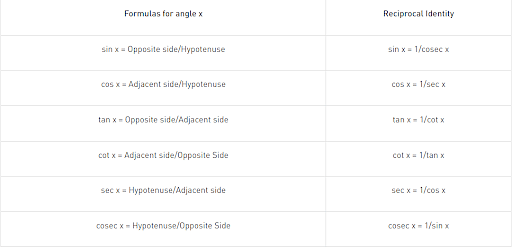If $\tan \, \theta = \frac{\cos 25^{\circ} + \sin 25^{\circ} }{\cos 25^{\circ} - \sin 25^{\circ} }$ and $\theta$ is in the third quadrant, then $\theta = $
- $200^{\circ}$
- $205^{\circ}$
- $225^{\circ}$
- $250^{\circ}$
The Correct Option is D
Solution and Explanation
Top Questions on Trigonometric Functions
- Find the value of \[ \tan\!\left[\left(2\sin^{-1}\frac{2}{\sqrt{13}}\right)-2\cos^{-1}\!\left(\frac{3}{\sqrt{10}}\right)\right] \]
- JEE Main - 2026
- Mathematics
- Trigonometric Functions
- The no. of solution in \(x \in \left(-\frac{1}{2\sqrt{6}}, \frac{1}{2\sqrt{6}}\right)\) of equation \(\tan^{-1}4x + \tan^{-1}6x = \frac{\pi}{6}\) is :
- JEE Main - 2026
- Mathematics
- Trigonometric Functions
- If the value of \(\frac{\cos^2 48^\circ - \sin^2 12^\circ}{\sin^2 24^\circ - \sin^2 6^\circ}\) is \(\frac{\alpha + \beta\sqrt{5}}{\gamma}\) then value of \((\alpha + \beta + \gamma)\) (where \(\alpha, \beta, \gamma \in \mathbb{N}\) and are in lowest form) :
- JEE Main - 2026
- Mathematics
- Trigonometric Functions
- If \[ \frac{\cos^2 48^\circ - \sin^2 12^\circ}{\sin^2 24^\circ - \sin^2 6^\circ} = \frac{\alpha + \sqrt{5}\,\beta}{2}, \] then the value of \((\alpha + \beta)\) is
- JEE Main - 2026
- Mathematics
- Trigonometric Functions
- Evaluate: $ \tan^{-1} \left[ 2 \sin \left( 2 \cos^{-1} \frac{\sqrt{3}}{2} \right) \right]$
- CBSE CLASS XII - 2025
- Mathematics
- Trigonometric Functions
Questions Asked in AP EAMCET exam
Which of the following are ambident nucleophiles?
[A.] CN$^{\,-}$
[B.] CH$_{3}$COO$^{\,-}$
[C.] NO$_{2}^{\,-}$
[D.] CH$_{3}$O$^{\,-}$
[E.] NH$_{3}$- AP EAMCET - 2024
- Acids and Bases
- The correct sequence of enzymes involved in the commercial production of ethanol by fermentation from sugar is:
- AP EAMCET - 2024
- Acids and Bases
- At 298 K, the ionization constant of \( {CN}^- \) is \( 2.08 \times 10^{-6} \). What is the ionization constant of its conjugate acid? (Given \( K_w = 10^{-14} \))
- AP EAMCET - 2024
- Acids and Bases
Identify the anomers from the following.

- AP EAMCET - 2024
- Acids and Bases
The standard Gibbs free energy change \( \Delta G^\circ \) of a cell reaction is \(-301 { kJ/mol}\). What is \( E^\circ \) in volts?
(Given: \( F = 96500 { C/mol}\), \( n = 2 \))- AP EAMCET - 2024
- Acids and Bases
Concepts Used:
Trigonometric Functions
The relationship between the sides and angles of a right-angle triangle is described by trigonometry functions, sometimes known as circular functions. These trigonometric functions derive the relationship between the angles and sides of a triangle. In trigonometry, there are three primary functions of sine (sin), cosine (cos), tangent (tan). The other three main functions can be derived from the primary functions as cotangent (cot), secant (sec), and cosecant (cosec).
Six Basic Trigonometric Functions:
- Sine Function: The ratio between the length of the opposite side of the triangle to the length of the hypotenuse of the triangle.
sin x = a/h
- Cosine Function: The ratio between the length of the adjacent side of the triangle to the length of the hypotenuse of the triangle.
cos x = b/h
- Tangent Function: The ratio between the length of the opposite side of the triangle to the adjacent side length.
tan x = a/b
Tan x can also be represented as sin x/cos x
- Secant Function: The reciprocal of the cosine function.
sec x = 1/cosx = h/b
- Cosecant Function: The reciprocal of the sine function.
cosec x = 1/sinx = h/a
- Cotangent Function: The reciprocal of the tangent function.
cot x = 1/tan x = b/a
Formulas of Trigonometric Functions:
